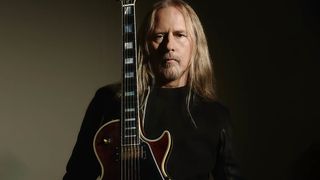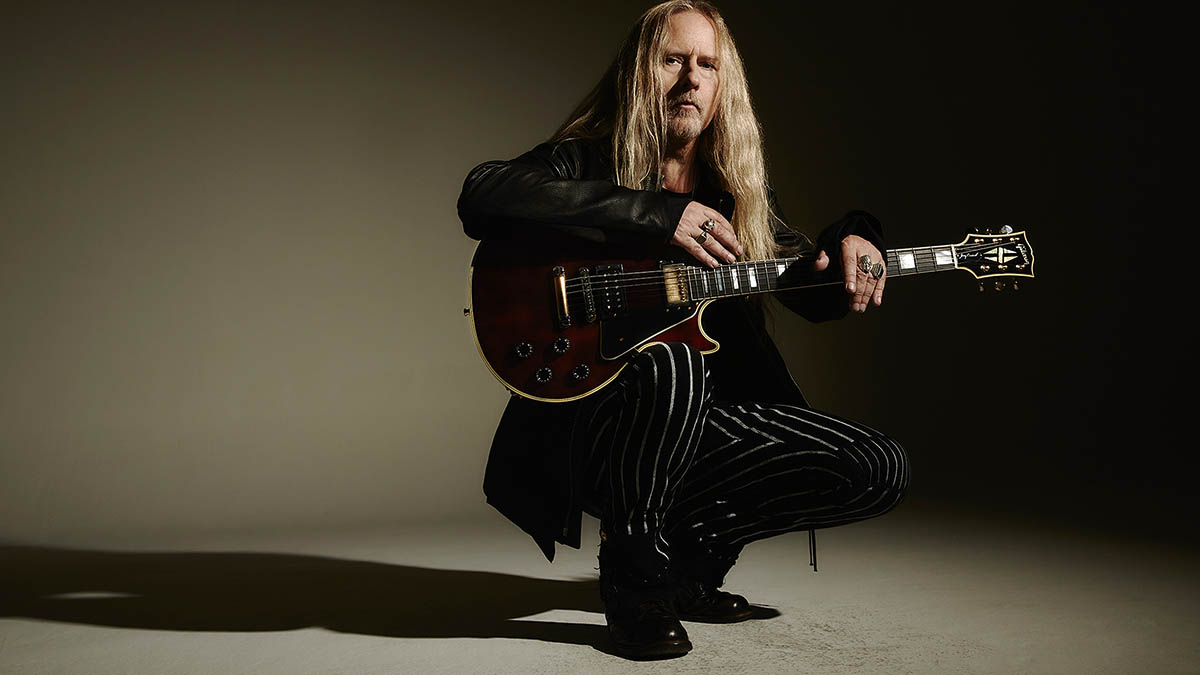Did Jerry Cantrell Do the Art on His Guitar
Jerry Cantrell: "I'chiliad a guitar thespian who loves kickass riffs. I grew upwards on them, so I knew to write something, you lot'd need the riff..."

Jerry Cantrell has a way with chords. The Alice In Bondage guitarist can take fifty-fifty the simplest of ideas and supercharge them with an emotional pull that sucks the listener right into the deep end of whatever mood he's trying to convey.
From the Seattle grouping'southward original run in the '90s, through his ain solo endeavours and since the ring's rebirth in 2005, Cantrell'southward mastery has made him one of rock's true visionaries – a writer and thespian who makes you hear, experience and believe every discussion and notation.
On his new solo album, Brighten, he'south embracing state music, yet withal using the aforementioned electric guitar he'due south used since Alice In Bondage' debut Facelift – an anthology that did so much to shape the sound of alternative rock in 1990. His motto: "Do what's right for yous."
Which artists have influenced yous nearly in terms of songwriting?
"It'south hard to narrow down because I'm just a fan of songwriting in full general. I probably got turned onto the idea of it by listening to Elton John. That stuff felt really cool and I knew deep down I'd like to practice something like that. I was too raised on country music, which is simplistic songwriting 101. They know how to get something across in a succinct manner.
"Pink Floyd were a big influence on me, the same goes for Led Zeppelin, Sabbath, The Beatles, Fleetwood Mac, the Eagles and many more. I think greatest acoustic writer of best has got to be Bob Dylan. Or Willie Nelson. Those ii guys accept been pretty ballsy and prolific.
"There are dissimilar components to it all, but I'thou a guitar role player who loves kickass riffs. I grew upwards on them, then I knew to write something you'd demand the riff, the melody, and then something to say. Those are the main things. Then you need a great band to execute it, which is something I've been really fortunate with over the years..."

Then which of your guitars accept you ended upwardly writing almost of your songs on?
"For electrics, it'south definitely my 1985 Chiliad&L 'Blue Clothes' Rampage. Funnily plenty, I've semi-retired that guitar. It's up at a museum in Seattle right now. When nosotros started making this tape, and maybe even the last AIC album, I had to request them to ship it back to me for the studio sessions.
"That guitar has been on every tape I've e'er made, in 1 form or another. I don't know if in that location'south one single audio-visual that I've written extensively on, that's a fleck more than varied and changes depending on the era.
"For the few years preceding the Unplugged tape [Alice In Chains' MTV Unplugged, released in 1996], it was that Guild. There were other periods where I was really connected to a Martin. And over the last vi or vii years, it'southward mainly been Gibson Songwriters."
Speaking of Songwriters, the audio-visual you're playing in the video for the new song Atone has certainly sparked a lot of speculation...
"Yeah, in that location might exist something coming! I have to say, working with JC [James Curleigh, CEO] and Cesar [Gueikian, Brand President] from Gibson has been really good so far. Of course I have a long partnership with G&L, and I'm always going to play them.
"They're a part of me, a part of my audio. On this album maybe I used more Gibsons and changed the equation a lilliputian scrap, but I was excited about what they're doing. Information technology'southward Gibson, for God'southward sake! They're so rock 'northward' roll."
Atone feels more deeply rooted in country stone than anything you've recorded before – in that location'due south that pocket-size to major 3rd bend in the riff, for example.
"Yeah, in that location'due south definitely a lot of that state feel in Atone. Information technology'southward a very rock and ringlet record, and you take to recollect rock and roll spawned out of state and dejection. It's a mixture of the two. Even if yous go dorsum to the AIC EPs and early on stuff, country was somewhere in there. Information technology'southward always been an ingredient in the mixing bowl."
And information technology sounds like you're using an open C# tuning (C#, Thousand#, C#, F, G#, C#), which we've heard before on tracks like Over Now .
"That is absolutely correct. It's the fourth runway I've recorded with that particular tuning – in that location's Over Now, Nothin' Song, Injure A Long Fourth dimension and now Atone. In that location's a hypnotic drone to information technology – I've always been a big fan of that. The tuning almost puts you in a trance, which is what I was going for with Atone, which ended up having an almost Western flavour to information technology."
The way I record is very experimental. Information technology's like, 'Okay, allow'south try a Laney Klipp and a Flying 5 with a chorus pedal and a 25-watt Celestion cab!' And we'll just come across what happens
Was information technology the Alice In Chains rig with yous for the sessions, or did yous cease up trying something different?
"Some of it was the same. Friedman amps are the main stone sound. As always, there was a healthy dose of both Gibsons and G&Ls, and I was peppering in different guitars. Gibson sent over some really cool stuff, 4 guitars for the tape to get some flavours I didn't have.
"There was a Firebird, a cool onetime SG, a Goldtop Les Paul and this Trini Lopez guitar. The way I record is very experimental. It'south like, 'Okay, let'due south try a Laney Klipp and a Flying V with a chorus pedal and a 25-watt Celestion cab!' And we'll only come across what happens.
"We'd bring every guitar, amp and pedal I ain to the studio and also borrow what we didn't accept. Amp-wise, I know we used some AC30s, Soldanos, Marshalls, there was an Orange in there somewhere, and this really one-time Fender cab. And it was the same with acoustics – Gibsons, Martins, Guilds, a whole mix of stuff. Nosotros become by feel, and I really like that part of information technology."
Exercise you lot carve out time for writing or does it commonly happen on the fly?
"Yeah, it does just come sometimes, though it's important to put in the necessary piece of work, too. When I lock into a writing phase, I'm in! I know it will be a process of months, perhaps a twelvemonth, only once I'chiliad locked in, I stay there until I'chiliad washed.
"Before that, though, I'one thousand collecting. So whenever you are strumming through ideas and something catches your ear, you lot need to choice upwards the phone or use a tape recorder or any, record the riff and move on.
"By the time you lot get to the point where y'all are motivated to climb the mountain – because it is a big endeavour that won't cease until you are truly washed – you lot want plenty of ideas to go into the process with."
Going dorsum to 1992 and the classic Alice In Bondage song Down In A Hole – what do you lot remember about writing it?
"I couldn't tell you exactly where or how I came upwardly with information technology. Just that detail tune felt pretty magical early. Some songs just seem to ascent above for some reason and that's i of them.
"Songwriting is like trying to grab lightning in a bottle. The execution came out really well – Layne [Staley]'s vocals were sick, Sean [Kinney]'s drums were plodding and thunderous and Mike Starr's bass playing is epic on that, likewise. You have to give a ton of credit to the grouping of fellas who elevated it and put themselves into it.
"I may have written it but it needed all of us to push button into the place where information technology lives. In terms of songwriting, it's certainly among my best and one of the ones I'm nigh proud of."
On that vocal there's no guitar solo every bit such, only some big harmonised bends at the outset and a laid-back outro lead. Y'all were clearly playing for the song, first and foremost.
"Sometimes you don't need a 'solo' solo. There were a few songs on this new album that didn't need 1, either. Sometimes it'south better to make your guitar part of the cloth and sometimes you need to unzip the fly and whip it out. It just depends on what the song needs."
On those first ii Alice In Chains albums – Facelift and Dirt – you played a big role in popularising drop D-style riffing with songs such as Nosotros Die Young and Dam That River . When did you first start tuning down?
"I take to give Eddie Van Halen all the credit. I learned drop D because of Unchained. I simply loved the sound of him on that, it was so heavy. Equally we were forming the band, I was already messing with tuning a half footstep down anyway. So when you drop that lower string farther, it's a note and a one-half from standard.
"And that adds a ton of thickness and sludge – information technology can make you way more than savage sounding for the heavier shit, like Dam That River, but even on the lighter stuff, too. It just adds this weight to everything. I don't recollect nosotros've ever recorded in regular pitch, to be honest."
How much practise scales and chord theory play a office in your songwriting process?
"I've got a lilliputian cognition. I had a few lessons when I was starting out. I was able to read music well even before I started playing guitar, considering I was in the choir. I couldn't do it now.
"I left that behind and kinda wish I hadn't, considering it would brand things a lot easier! I don't know why – I guess sometimes information technology'south fun to turn the lights out. No guides, no grids, no vision. See what the fuck happens and dig your way out of that.
"I remember about diving back into that stuff, but the other half of me says, 'You've been doing pretty good so far, why fuck with it?!' That'southward all that matters... Do what's correct for you."
My biggest communication would exist don't listen to what anyone else says... Always
And what'due south the biggest lesson you've learned forth the manner?
"My biggest communication would be don't mind to what anyone else says... Ever. If it's a producer or another songwriter or someone yous respect, you can acquire some shit from them, and so don't completely disregard stuff – information is a practiced thing – but personal experience is where music should come from.
"It'due south gotta come from you. If it makes yous feel, it will make somebody else experience. Believe in yourself and you can write your ain Clay or Burnish or whatsoever it is!"
- Brighten is out at present.

Cheers for reading five articles this month*
Join now for unlimited admission
U.s. pricing $three.99 per calendar month or $39.00 per year
United kingdom pricing £2.99 per month or £29.00 per year
Europe pricing €3.49 per calendar month or €34.00 per year
*Read 5 free articles per calendar month without a subscription

Join now for unlimited access
Prices from £2.99/$3.99/€3.49
Source: https://www.guitarworld.com/features/jerry-cantrell-brighten-tg
0 Response to "Did Jerry Cantrell Do the Art on His Guitar"
Postar um comentário